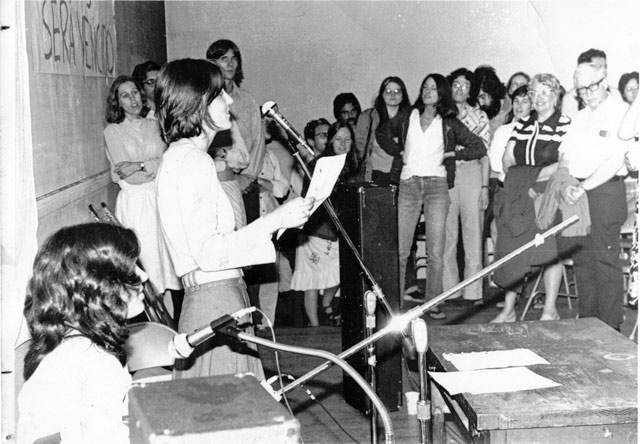Radical Passions: A Memoir of Revolution and Healing

Destination: Revolution
Radical Passions: A Memoir of Revolution and Healing
By Kendall Hale
iUniverse, Inc., 2008, 229 pages, $18.95
In 1968, Kendall Hale watched the Democratic National Convention in Chicago on TV from her family’s living room in Indiana. Her reaction was one of anger as she paced the floor, railing against a government that would deny citizens their right to free speech. Forty years later, Hale tells her story of a life launched by that passion and characterized by struggle, song, occasional heartache, and physical and spiritual healing.
Raised in a Mormon family, Hale frightened her parents by going off to college at the University of Wisconsin, Madison, and joining antiwar protesters and Black Panthers in the streets and on the barricades, shouting “Power to the people!” and getting pepper-gassed. The confrontations between students and police thrilled her, but when faced with the aftermath of real violence — the Weatherman’s Days of Rage in October 1969 — she recoiled at the broken windows and thoughts of armed resistance.
Then, late in the summer of 1970, students bombed the military research building on campus, killing a physicist who was working late at night. Disillusioned and increasingly drawn to socialism and feminism, Hale dropped out of school to connect with the working class and overturn capitalism. She spent the majority of the 1970s working various industrial jobs and doing union organizing. Her search for worker solidarity eventually led her to a welder’s job at a shipyard in Quincy, Mass., where she endured life-threatening working conditions in order to fight for workers’ rights.
It was during this time that Hale helped form the New Harmony Sisterhood Band, a folksy bluegrass women’s group that sang in many-part harmony about abortion, sexual harassment, workers’ rights, and other political and feminist issues to the accompaniment of a guitar or mandolin. Their music was outspoken, sometimes raw, and always powerful and can be heard at www.radicalpassions.com. Although the group disbanded, music remained one of the endeavors that Hale never lost faith in.
From decade to decade and continent to continent, Kendall Hale pursued the revolution — via Marx, Lenin, Castro, and Mao — only to find discontent and disillusionment. It’s hard to say these experiments failed, however. Hale did get that rare opportunity in activism to see the results of her labors when she returned to the halls of her high school to find civil rights giant Martin Luther King Jr.’s portrait hanging in the hall among photos of top students, many of them girls.
GETTING NORMAL?
Although she titled her chapter about marriage and motherhood “Getting Normal,” what followed was anything but. A few years after the backyard wedding, she and her husband and daughter were in Estelí, Nicaragua, helping build a health clinic for the Sandanistas. Back in the States, an experiment with co-housing failed. In Maui, Hale had a vision of a Golden Rainbow, said to bless all those who see it. But New Age enlightenment also found her cynical: “How much did I pay for this workshop, how in God’s name did I get here, and where [is] the nearest exit?” she wrote of a North Carolina conference she found herself attending.
The memoir avoids political name dropping and operates under the premise that “the personal is political,” rich with details about leg shaving, a planned home birth, gardening, and dream analysis. Black-and-white photos accompany the story, mostly of Hale and her family and friends, as well as some newspaper clippings. The camera captures these ordinary people in ordinary and extraordinary moments — a wedding, a demonstration, or constructing a passive solar house in Boston — much as the book chronicles everyday actions and revolution on the same page.
At times it is apparent that the book was self-published, especially to a reader keen on commas, but the book’s sincerity and honesty will be reward enough for whoever can look past these minor flaws. The organization of the book may be frustrating for some as well. The narration occasionally jumps forward in a disorienting break in chronology — for example, to comment on Planned Parenthood bombings by anti-abortion extremists or labor conditions in China — and then back to the story.
Kendall Hale’s memoir is that of a seeker who has not yet found the answer she is looking for. Approaching “cronehood,” as she calls it, she continues to search inwardly and outwardly for a true revolution, political or spiritual. The few moments of peace she encounters meditating, practicing massage therapy, or working in her garden fuel her quest rather than placate her. If she continues on this path, she may have to write another memoir — the one in which she finds what she seeks.
